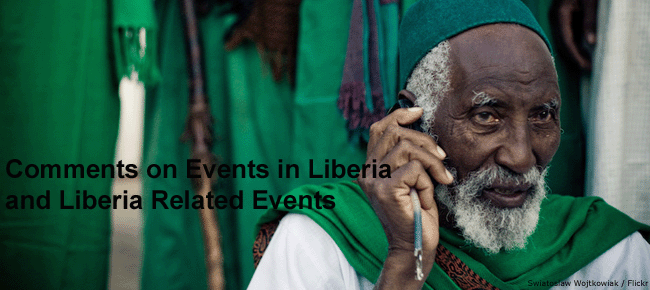Liberia and the Ivory Coast Crisis
For more than 30 years Ivory Coast was a beacon of prosperity and peace in West Africa (1960 - 1993). The economic miracle that took place in the worlds' number 1 producer of cocoa attracted millions of migrant workers from neighboring states, notably Mali and Burkina Faso. The country's first President, Houphouët-Boigny, was a national hero, nearly a saint. However, he did not allow any contestant to oppose to his rule and popularity. When he died, almost exactly 17 years ago, on December 7, 1993 a power struggle emerged which initially was won by the president of the country's parliamant, Henri Konan Bedié - who defeated the then Prime Minister Alassane Ouattara - but who already in 1995 had to face a coup attempt and who four years later was forced out of power by a military coup whose leaders asked one of Bedié's enemies, General Robert Guéï, to lead the junta. The 2000 presidential elections, from which Alessane Ouattara was excluded because of his alleged Burkina origin, were boycotted by the major political parties. General Guéï claimed to have won the elections but street protests eventually brought Laurent Gbagbo, leader of a small and relatively insignificant political party, to the presidential palace. Two years later the civil war started, General Robert Guéï was assassinated. Since 2002 the country has been divided: the north under control of the 'rebel forces', the south 'governed' by President Gbagbo whose presidential mandate expired in 2005 but who managed to postpone presidential elections until recently, in 2010.
According to virtually all observers the recent presidential elections were won by Alassane Ouattara - who won 54% of the vote - but Laurent Gbagbo claimed he had won the elections. Subsequently both men had themselves sworn in as the country's new president.
The 68-year old Alassane Dramane Ouattara aka ADO is a former Vice Governor of the BCEA, the Central Bank of West African States, and a former high ranking official of the International Monetary Fund in Washington DC. Prior to his appointment by President Houhouët-Boigny as Prime Minister, in 1990, ADO was Director of the Africa Department of the IMF. After Houphouët-Boigny's death he returned to Washington as the IMF's Deputy Managing Director.
Alessane Ouattara is supported by France, Europe, the US and UN. Also the leaders of the Economic Community of West African States (ECOWAS) back Ouattara and reject Gbagbo, and have decided to suspend Ivory Coast from the regional organization. Former South Africa President Mbeki mediates on behalf of the African Union whereas the chair of the Mano River Union, President Ellen Johnson Sirleaf, has warned former Liberian warlords against interference in the Ivorian crisis. All fear that Ivory Coast is heading to civil war. Gio speaking Ivorians from the Yacouba tribe, supporters of Gbagbo, are fleeing to Liberia. They consider this neighboring country a safer heaven than their own country where 9,000 UN peacekeepers are stationed. Despite the unfolding tragedy in Ivory Coast, it is something the Sirleaf Administration can be proud of - only a few years ago Liberia was a hell from which tens of thousands fled: to neighboring countries, to Europe, and to the USA.
What will happen in the near future is uncertain. Politicians, mediators and other stakeholders will try to find a political solution, maybe a power-sharing agreement but it is not likely to work. Experiences in Kenya and Zimbabwe are not giving us much hope. The country may slip into chaos again. Both contestants - Gbagbo, an academic historian, and Ouattara, a development economist - are going for the highest prize: the presidential palace. Only one can win. I fear that the real losers will be the population of Ivory Coast and in neighboring countries including Liberia.

